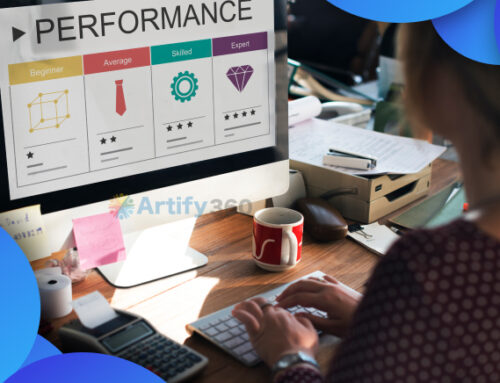Managing employee performance is essential for organizational success in today’s competitive business landscape. Employee performance appraisals play a vital role in this process, providing a structured way to evaluate and enhance workforce productivity. With the help of Artify360 HR software, managing these appraisals becomes streamlined and efficient.
This article will explore how Artify360 simplifies the performance appraisal process, making it a valuable tool for businesses seeking to boost employee engagement, set clear expectations, and improve overall performance management. Let’s delve into the world of employee performance appraisals and how Artify360 can transform this crucial HR function.
Overview of employee performance appraisal
Employee performance appraisals, also known as performance reviews or evaluations, are a critical component of the human resources function within any organization. They serve as a systematic and structured process for assessing and evaluating an employee’s job performance, competencies, and contributions to the company.
The primary goal of performance appraisals is to provide employees with constructive feedback on their work, identify improvement areas, set future performance goals, and recognize and reward outstanding contributions.
In most companies, performance appraisals are conducted regularly, often annually, although some organizations opt for more frequent reviews. The process typically involves a dialogue between the employee and their supervisor or manager, during which they discuss the employee’s accomplishments, strengths, weaknesses, and development needs.
These discussions help align individual performance with the company’s objectives and values, providing a basis for decision-making regarding promotions, raises, bonuses, and training opportunities.
Performance appraisals consist of several key components:
Goal setting: Establish clear and specific performance goals and objectives for the employee during the appraisal period.
Performance measurement: Evaluating the employee’s work against these predefined goals. This involves considering job competencies, skills, and overall job performance.
Feedback: Providing the employee with constructive feedback on their performance. This includes acknowledging areas where they excel and areas where improvement is needed.
Development planning: Identifying opportunities for the employee’s professional growth and development can include training, skill-building, and career progression.
Recognition and rewards: Recognizing and rewarding employees for exceptional performance through various means, such as promotions, salary increases, bonuses, or awards.
Performance appraisals help employees understand their roles and expectations within the organization, fostering a sense of accountability and motivation. They also provide a platform for open communication between employees and management, allowing for the exchange of ideas and concerns.
Types of performance appraisals
Employee performance appraisals come in various types, each designed to suit organizational needs and goals. Understanding these other appraisal methods can help businesses tailor their approach to performance management. Here, we’ll explore the most common types of employee performance appraisals:
- Self-appraisals:
Self-appraisals, as the name suggests, involve employees assessing their performance. They provide a self-assessment of their achievements, strengths, and areas for improvement.
This method encourages self-reflection and personal responsibility, promoting employee engagement in their development. Self-assessments may be biased, so combining them with other appraisal methods is vital. - 360-degree feedback:
This comprehensive approach collects feedback from various sources, including supervisors, peers, subordinates, and customers. The employee’s self-assessment is also included.
Provides a holistic view of an employee’s performance, reducing bias and allowing for a more accurate evaluation. Requires careful design and management to ensure confidentiality and objectivity. - Traditional performance appraisal:
This is the most common type of performance appraisal, typically conducted by a supervisor or manager who evaluates the employee’s performance based on predefined criteria and goals.
It’s a structured and straightforward method for assessing an employee’s work against set standards. It may lack a comprehensive view of the employee’s performance. - Upward appraisal:
In upward appraisal, employees assess their supervisors’ performance. This method encourages employees to provide feedback on their manager’s leadership and management skills.
It enhances the supervisor-employee relationship and helps managers understand their impact on their team. Employees may fear retaliation or repercussions, so anonymity and confidentiality are crucial. - Employee-initiated reviews:
This approach empowers employees to request performance reviews when they feel necessary. They can initiate the process and set the agenda.
Increases employee engagement by giving them a more active role in their development and career progression. It requires a culture of open communication and trust.
Each of these performance appraisal methods has its unique advantages and challenges. Depending on their specific goals and workplace culture, organizations may choose to use one or a combination of these methods.
The appraisal method should align with the organization’s values and objectives, ensuring it leads to more effective performance management.
How to organize employee performance appraisals in a company
Effective employee performance appraisals are crucial for enhancing an organization’s overall productivity and employee development. Here’s how to organize performance appraisals in your company:
- Advance feedback:
Before the appraisal meeting, encourage managers to provide ongoing employee feedback. Timely feedback helps employees understand their progress and performance expectations.
Advise managers to address both strengths and areas for improvement during these conversations. This practice creates a foundation for the formal appraisal, ensuring no surprises and allowing employees to work on their development areas. - Ensure documentation:
Documenting employee performance throughout the year is vital. This documentation includes achievements, projects completed, challenges faced, and areas for improvement.
Encourage managers to maintain records that can be used during the performance appraisal discussion. A comprehensive record provides evidence to support feedback and ratings during the appraisal process. - Give essential time to employees:
Allocate sufficient time for the appraisal meetings. Rushed discussions can hinder meaningful conversations. Both the manager and employee should have ample time to discuss performance, set goals, and provide and receive feedback. A relaxed atmosphere during the appraisal ensures that employees feel heard and valued. - Provide a chance for employees to speak up:
An effective appraisal process should be a two-way conversation. It’s not just about the manager evaluating the employee; it’s also an opportunity for employees to share their perspectives.
Encourage employees to express their thoughts, career aspirations, and any concerns they may have. This open dialogue promotes engagement and helps identify areas where the organization can better support employees. - Focus on the employee’s future:
Performance appraisals should not solely dwell on past performance. They should also be forward-looking, emphasizing the employee’s development and growth. Managers should discuss the employee’s career goals and the necessary steps. Organizations can motivate employees and align their goals with the company’s by focusing on the future.
Organizing employee performance appraisals is an ongoing process that requires commitment and diligence. It’s not just an annual event but a continuous cycle of feedback, goal setting, and development.
Artify360 HR software simplifies this process by providing a centralized platform for documentation, feedback, and goal tracking. This helps companies ensure that performance appraisals are efficient and consistent and ultimately contribute to the growth of both employees and the organization growth.
How Artify360 streamlines employee performance appraisals in a company
Artify360 HR software is pivotal in organizing employee performance appraisals in your company. Here’s how it simplifies and streamlines the process:
- Centralized data management:
Artify360 acts as a central repository for all employee performance-related data. It stores historical performance appraisals, employee feedback, and goals. This centralization makes it easy for managers and employees to access past performance records, ensuring continuity in feedback and development. - Automated reminders:
The software sends automated reminders to managers and employees, ensuring that appraisal meetings are scheduled and conducted on time. This feature eliminates the risk of missed appraisals and maintains a regular cadence of feedback and goal-setting. - Customizable appraisal templates:
Artify360 offers customizable appraisal templates tailored to your company’s specific evaluation criteria. Managers can use these templates to structure performance assessments and ensure that all key areas are covered during the appraisal. - Goal tracking and alignment:
The software enables organizations to set performance goals and align them with individual employees’ objectives. Managers and employees can regularly track progress toward these goals, ensuring that appraisals are about past performance and future development. - Employee self-appraisals:
Artify360 allows employees to provide self-assessments, giving them a voice in the appraisal process. This fosters a sense of ownership and encourages open communication between employees and their managers. - Data-driven insights:
The software generates insights from performance data, enabling organizations to identify trends and areas for improvement. These insights help make informed decisions about employee development, training, and resource allocation.
Artify360 HR software streamlines and simplifies the employee performance appraisal process, making it more efficient, transparent, and productive for managers and employees. By using this software, companies can ensure that performance appraisals are a continuous, data-driven, and constructive part of their HR strategy.






